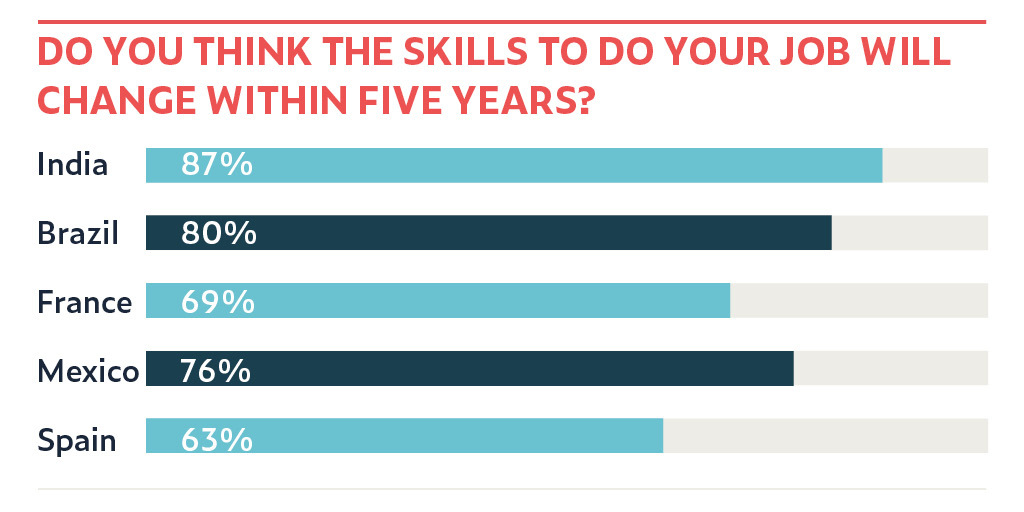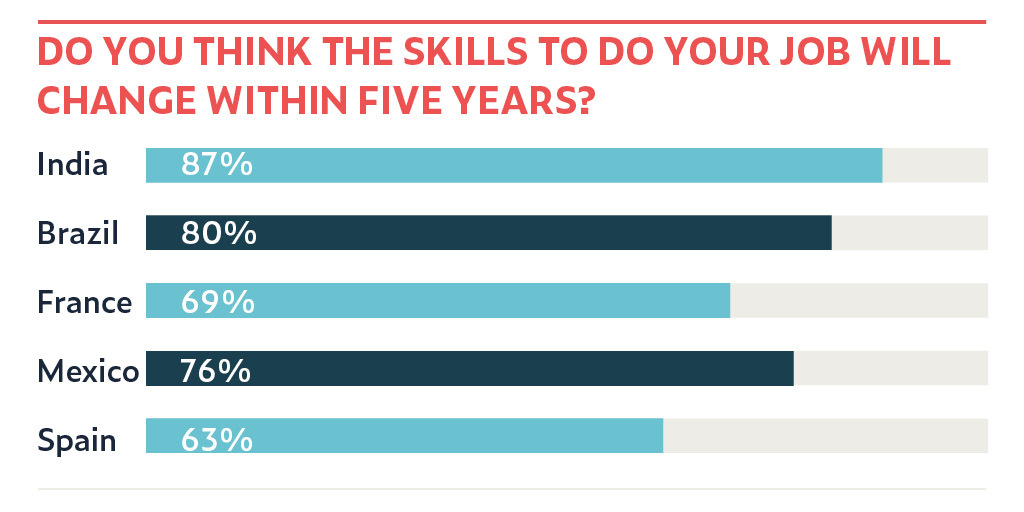Change, as they say, is the only constant. And today this adage rings truer than ever before. It’s time to change – or rather, to adapt to the fast-changing times.
Given that COVID has accelerated changes in the way we work and the skills needed, upskilling programs have transitioned from good-to-do to need-to-do. It is now a matter of survival in the workforce.
A survey carried out by McKinsey called – The McKinsey Global Survey – stated that over 87% of the executives are either already experiencing or expecting changes in the skills demanded by jobs.
Here are some telling numbers

Source: Udemy, 2019/2020 Global Skills Gap Report
Table of contents:
A comprehensive skills-gap report compiled by Udemy – an American MOOC provider – sheds considerable light on the upskilling and reskilling trends, and also on where the gaps are.
Skills gap report found that over 94% of Brazilians are concerned about the skill gap. Be it the millennials, Gen X or the Baby Boomers; the trends remain similar. Owing to the current scenario, organizations are valuing the tech and digital skills the most followed by leadership skills. Thus, over 56% feel that AI will take over their job roles in the next five years. In Brazil, online courses are coming or the aid for people looking to upskill and reskill. In fact, the report states that over 58% of the employees who have taken to online learning are more skilled than their colleagues.
Moreover, what’s interesting to know is that over 67% of Brazilians feel that their university education didn’t arm them with the skills needed to face the real-world cut-throat competition in the job market. This pretty much explains why more than 50% of the people surveyed admitted to having been dishonest to get jobs or promotions.
France, in contrast, is a developed nation. Though 91% of the full-time respondents, acknowledged the skill gap, only 49% felt affected by it at a personal level. The French (roughly 75%) blame AI for their job losses in a major way. Tech skills are the most valued here too.
One glaring difference is that in France, companies are playing the lead role and taking a step forward in reskilling and upskilling their team through company-sponsored programs. However, one commonality is that the widening skill gap has been compelling people to disregard ethical standards while applying for a job or promotion.
Indians seem concerned with the current employment landscape, with over 92% affirming the existence of a skills gap. The situation becomes even more worrying upon observing that this skill gap affects 76% of the people personally. However, one positive takeaway from the report was that Indians largely seem to be confident in facing this situation and emerging stronger and more skilled than before.
Regardless to say, the tech and digital sectors remain the most in-demand here too reflected in the fact that over 82% feel that AI is taking away their job roles. Other than developed nations, the tendency to opt for online courses for reskilling and upskilling seems to be common among many countries. Another common point that has emerged is the gaps in college education in these countries to train the workforce for the needs of today.
The United States and the European nations haven’t remained untouched either in skill gap report. Back in 2017 figures by the European Commission states that over 37% of the workers were not equipped with even the most basic of digital skills. However, today there is growing awareness about the issue. Over one-third of hiring managers in the USA believe that workforce development programmes are the key to innovation.
Here’s how some countries feel with their college degree equipping them with the right skills.

Source: Udemy, 2019/2020 Global Skills Gap Report
In light of the above findings, it is clear that organizations need to take stock of their people’s skills and recalibrate them accordingly.
Here are a few things that can be done:
- First and foremost, it is the need of the hour to switch over to and aggressively promote new-age technology backed programs. Traditional ones are just not working anymore for the majority of the sectors. However, the difference in various sectors and the skills demanded by them should be kept in mind before imposing a particular option.
- Change in mindset is required from both the ends. Learners need to equip themselves to learn in self-paced environments, and coaches should arm themselves with all the skills needed to train people remotely. The focus should not just be on the learning curve but also on the humane side by way of emotional support in the unpredictable times.
- One major issue prevalent in developing nations is technology-related problems ranging from low bandwidth and the sheer lack of digital devices to disturbing power fluctuations and poor or no internet connectivity. The digital divide needs to be bridged for reskilling and upskilling programs to be implemented efficiently.
- Thorough re-evaluation and proper recognition of the star team members need to be ensured. Doing so will make it easier for organizations to identify the areas they need to work on and the areas that can be leveraged.
- It needs to be made sure that the learning is consistent and based on feedback. Constructive feedback is essential not just to keep the team members on track but also to keep a tab on their progress. Also, this is a great way to boost the morale of the team members by helping them feel seen and heard.
- Mobile-based micro-courses are the norm of the day. They significantly cut down on time consumption and information overload, which is much needed as a major portion of workers stated that time constraint is a major impediment in reskilling and upskilling.
- Most importantly, the learning programs should be designed in such a way that they integrate the courses with the work environment. Tangible and observable results will motivate the talent to put in more efforts in reskilling and upskilling.
Today, with the fast-changing times, people are serious about their organizations helping them reskill. It’s time to take stock, re-skill and prepare for the future of work.
Read more also: why is interest important when choosing a career?









![Best Universities in New Zealand for International Students [2025 Rankings]](https://tcglobal.com/wp-content/uploads/2025/09/Best-Universities-in-New-Zealand-for-International-Students-2025-Rankings-600x338.png)